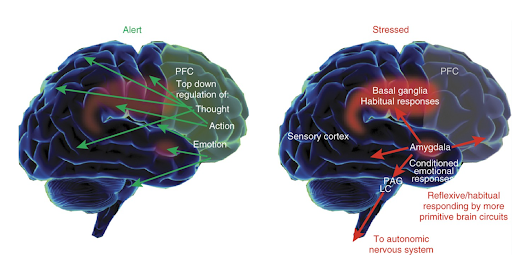
Cycle Syncing,
Menstruation
•
2025-08-06
Cortisol, stress and the menstrual cycle
By Dr. Emilė Radytė, CEO of Samphire Neuroscience
What does cortisol do?
Cortisol is often called “the stress hormone,” but that title doesn’t give it the credit it deserves. From an evolutionary perspective, cortisol is a finely tuned survival tool. It helps you adapt to unexpected situations, sharpen your focus when needed, and mobilize energy so you can respond quickly to potential threats and dangers. When something sudden or threatening happens, whether it’s a predator in our ancient past or an urgent email today, cortisol helps shift the body into a high-alert state.
The brain is cortisol’s main target
Cortisol’s first and most important stop is your brain. When cortisol binds to receptors in areas of the brain like the hypothalamus, hippocampus, and prefrontal cortex (PFC), your brain interprets the signal as “we’re in a state of stress.” In response, the brain triggers a series of neurological and hormonal messages that are then sent throughout the body, which change heart rate, breathing, immune activity, and digestion. This is why stress feels, and is, like a full-body experience: the brain is orchestrating it from the top down.
When is high cortisol good?
Short bursts of high cortisol are a normal, healthy response. They prepare you to act decisively, improve reaction speed, and direct energy toward systems you need in that exact moment to respond to whatever situation is in front of you. Historically, stress was rare: you were meant to spend most of your time in the parasympathetic “rest-and-digest” mode, and only shift into high-cortisol states in brief, urgent situations.
When short-term stress turns to chronic stress
Over the last decade, and especially since COVID-19, many people have moved from occasional stress to daily stress. Does that sound familiar? That means a hormone that evolved to be rare is now constantly active for most of us, reshaping how our brains and bodies function over time. For example, we now know that prolonged high cortisol changes the way brain networks communicate, affects emotional regulation, and can keep the immune system in a perpetual state of alert.

Brain function and control changes under stress, reproduced from Arnsten et al., 2015 (Nature Neuroscience)
Can your menstrual cycle affect cortisol levels?
Chronic stress isn’t something you can switch off with willpower. Once the brain perceives a threat, whether physical, emotional, or social, it takes focused, deliberate action to return to calm. And for many women, that “threat signal” is shaped not only by life events but also by natural hormonal rhythms.
Research by Hamidovic and colleagues recently (2020) showed that cortisol levels can vary significantly between menstrual phases. These shifts are part of normal physiology, yet for those whose brains respond more sensitively to hormonal changes, they can amplify stress perception and emotional strain. That’s why it’s critical to understand whether your stress is tied to specific events, or if it follows a predictable, cycle-linked pattern. The latter is becoming increasingly common in our high-stress, always-on world where women are expected to perform every day, regardless of their cycle phase.
Tracking, understanding, and responding
If you don’t yet know whether your stress is linked to your cycle, you can track stress patterns with Samphire, identifying whether your elevated cortisol is event-based or cycle-linked. If you can manage or remove the external stressor, do that first. But when stress is inevitable, the most effective path is to focus on your brain’s response, strengthening your emotional and cognitive control over how stress affects you. Once you control your own response to the events around you - you also reduce your stress, by showing your brain that you are in charge, and that the situation is under control, so cortisol secretion can be stopped.
How Nettle™ supports stress regulation
For those whose stress is strongly linked to hormones or cycle phases, Nettle™ can help by targeting the brain’s top-down regulation systems directly. Through non-invasive brain stimulation, Nettle engages the prefrontal cortex and related networks to support steadier emotional control, allowing you to manage stress without disrupting otherwise healthy hormone production.
References
Arnsten, A. Stress weakens prefrontal networks: molecular insults to higher cognition. Nat Neurosci 18, 1376–1385 (2015).
Manchia M, Gathier AW, Yapici-Eser H, Schmidt MV, de Quervain D, van Amelsvoort T, Bisson JI, Cryan JF, Howes OD, Pinto L, van der Wee NJ, Domschke K, Branchi I, Vinkers CH. The impact of the prolonged COVID-19 pandemic on stress resilience and mental health: A critical review across waves. Eur Neuropsychopharmacol. 2022 Feb;55:22-83. doi: 10.1016/j.euroneuro.2021.10.864. Epub 2021 Oct 29. PMID: 34818601; PMCID: PMC8554139.
Mockaitis, A. I., Butler, C. L., & Ojo, A. (2022). COVID-19 pandemic disruptions to working lives: A multilevel examination of impacts across career stages. Journal of Vocational Behavior, 138, 103768.
James, K. A., Stromin, J. I., Steenkamp, N., & Combrinck, M. I. (2023). Understanding the relationships between physiological and psychosocial stress, cortisol and cognition. Frontiers in Endocrinology, 14, 1085950.
Dedovic, K., Duchesne, A., Andrews, J., Engert, V., & Pruessner, J. C. (2009). The brain and the stress axis: The neural correlates of cortisol regulation in response to stress. NeuroImage, 47(3), 864–871.
Echouffo-Tcheugui, J. B., Conner, S. C., Himali, J. J., Maillard, P., DeCarli, C. S., Beiser, A. S., Vasan, R. S., & Seshadri, S. (2018). Circulating cortisol and cognitive and structural brain measures: The Framingham Heart Study. Neurology, 91(21), e1961–e1970.
Montero-López, E., Santos-Ruiz, A., García-Ríos, M. C., Rodríguez-Blázquez, M., Rogers, H. L., & Peralta-Ramírez, M. I. (2018). The relationship between the menstrual cycle and cortisol secretion: Daily and stress-invoked cortisol patterns. International Journal of Psychophysiology, 131, 67–72.
Hamidovic, A., Karapetyan, K., Serdarevic, F., Choi, S. H., Eisenlohr-Moul, T., & Pinna, G. (2020). Higher circulating cortisol in the follicular vs. luteal phase of the menstrual cycle: A meta-analysis. Frontiers in Endocrinology, 11, 311.

